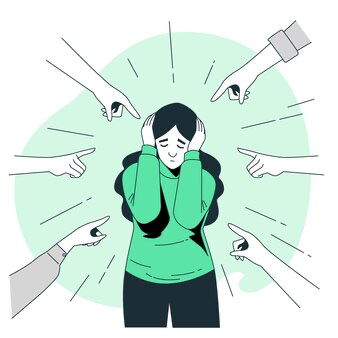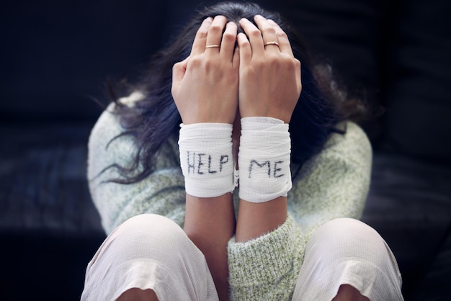Disclaimer: This article talks about the sensitive topic of self-harm, which was discussed during a recent Youth S.O.U.L. episode on TBC radio. The content of the article may be disturbing, so readers’ discretion is advised. If you are not yet twelve years old, please ask your parents or another safe adult to read the article to or with you. None of the Youth S.O.U.L. Team members is a licensed psychotherapist.
Self-harm is a deliberate, i.e., conscious and intentional act done to hurt yourself. It may be expressed through different modalities, including physical and emotional infliction, and for different reasons, including to gain pseudo-control in one’s life, as a non-verbal cry for help, or to replace overwhelming emotional distress with physical pain, self-punishment, and feelings of worthlessness. Since self-harm often stems from body insecurities due to negative comments on people’s bodies, it is encouraged that we “taste” our words (James 3:10–12) and use them to do
GUIDING TEENAGERSS
Being a teenager means being in one of the most impactful stages of one’s life, the effects of which can last well into adulthood. Indeed, one’s self-concept as a teenager affects one’s psychological and emotional health throughout that period and may have long-term effects later in life. According to the Recovery Village, the highest percentage of self-harm cases occur in people between 12 and 20 years old. In light of this, given the fact that the average age at which self-harm begins is 13, parents and guardians are encouraged to ensure that teenagers are supported, affirmed, guided, and prompted to share their thoughts and emotional distresses; are provided with an emotionally safe, listening, and welcoming outlet to do so; and are counselled on how to release and respond to said emotional distresses with care, compassion, and wisdom.
OVERCOMING SELF-HARM
Natalia’s Testimony
Natalia started self-harming as a 13-year-old child because she was battling with insecurities due to negative comments about her body. Natalia recounted to us on air that she felt ashamed of her self-harming behaviours and would wear a sweater almost every day while in high school. She even avoided telling her parents, she said. “It was such a shameful act.”
Now an adult, Natalia reflects on her journey to healing and overcoming the addiction, which, she said, found its genesis in a life-changing encounter she had with God.
“I remember one night, I was talking to Jesus. I was basically saying to Him, ‘God, how can You love me with these scars? How could You want to die for me knowing that I couldn’t even love myself? … You knew this. When You were dying on the cross, I was on Your mind, and You still thought it worthy of me, for You to die for me.’ [I] heard the voice of God reply, “Daughter, both of us have scars, but the reason for Mine is you.”

Inspired by this experience, Natalia went on to write a song called “The Cause.” The lyrics of one verse are:
“Take My hands with all these scars.
They’re just like yours, but (for) a different cause.
You wonder why, after all I saw,
I still died for you; I still took the cause –
It’s because you were My cause.”
Your experience
Your questions may not be the same, but they may be similar to the ones Natalia had. “How can I still be loved with all of this?” you wonder.
“God had you on His mind (while on the cross),” Natalia exhorts. “God knew everything that you would go through beforehand—every struggle that you would have encountered since birth. You may even have been rejected before birth (by your parents), but God knew all of it, and He still decided that you were worthdying for and that you were worth Hislife. Jesus willingly decided to lay His life down for you.”
Without a doubt, you are precious to Jesus, worth His life and death on a cross. His love for you is unconditional and steadfast; its aims and intentions are forever the same. God’s heart is always set on you (His cause): scars, flaws, and all.
“Give thanks to the Lord, for He is good; For His lovingkindness (graciousness, mercy, compassion) endures forever.” Psalms 136:1 AMP
“I will rejoice and be glad in Your steadfast love, Because You have seen my affliction; You have taken note of my life’s distresses.”Psalms 31:7 AMP
GOD’S WILL VS. SELF-PUNISHMENT
God knows all of the thoughts, cares, anxieties, and questions of the heart. Oftentimes, you may wonder, “How could God, such a holy God, love and accept me despite all my sins?” You may even feel discouraged by thoughts of being sinful and prompted by said thoughts to self-harm, self-sabotage, and self-punish. God is more mindful of the battle waging in your mind than you may think. Hear His heart on your issuethrough His Word.

“Whenever our heart convicts us [in guilt]; for God is greater than our heart and He knows all things [nothing is hidden from Him because we are in His hands].” 1 John 3:20
“Therefore, there is now no condemnation [no guilty verdict, no punishment] for those who are in Christ Jesus [who believe in Him as personal Lord and Saviour].” Romans 8:1
God is greater than our hearts, and though He convicts us to purify us for our good and wellbeing, He has promised in His Word that there is no condemnation, no guilty verdict, nor punishment for us in Him. God’s Word reveals His will, which is that we would know that our sins are acquitted (Romans 5:1) and that we are blameless to and immeasurably loved by Him as His beloved children (1 John 3:1), held secure in His sky-wide grace (Romans 5:2 AMP).
When we enlist in God’s army, invariably, we will ask ourselves: “Do you really have what it takes to serve God?” The only correct answer? You do not and never will, and that’s okay. Overcoming self-harm requires recognising that you are unable to change the self-inflicting thoughts and urges in your heart on your own, and that you must depend on God.
God is able to purify your heart—to transform you into someone who loves himself or herself and others with the love of Christ. He does this by renewing your mind and your thoughts about yourself and others through His Word. So, one way to overcome self-harm is to read the Word of God. In it we can find comfort, correction, conviction, truth, and freedom, and become able to overcome the thoughts that prompt us to sin against the ones Jesus died for—ourselves.
SEEK HELP IF YOU ARE SELF-HARMING
If you or someone you know participate in self-harm, there is hope; support is available.
- Seek help from a friend or family member to support you during the healing process.
- Professional counselling is also a great aid for navigating life’s difficulties and social struggles, and it may be something you could ask a parent or guardian to support you in receiving.
- Surround yourself with understanding older friends who will guide you and to whom you can speak when emotionally distressed is also helpful. Where no counsel is, the people fall: but in the multitude of counsellors there is safety. (Prov. 11:14). Ensure that you are never navigating distress alone.
- Finally, the first step to wholeness and complete emotional healing is having faith in Jesus Christ. Jesus loves you. He loved you enough to give Himself to die for your flaws and mistakes, and He loves you enough to heal you and bind up your wounds. Jesus is able to heal you in every way. Pray and have faith (rely on, believe) in Him.
“He heals the brokenhearted and binds up their wounds [healing their pain and comforting their sorrow].” Psalms 147:3 AMP






